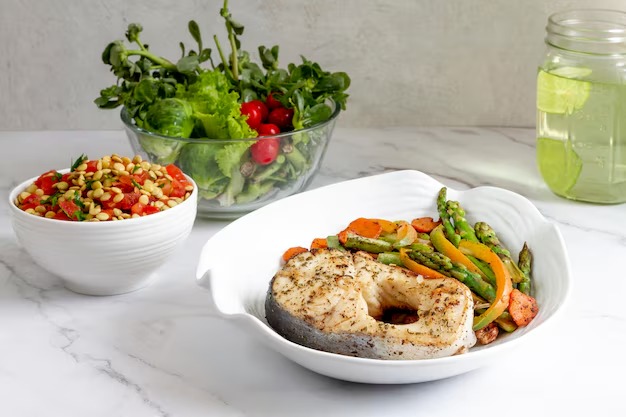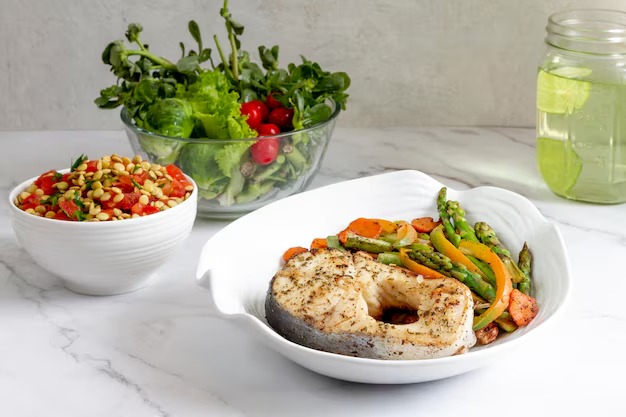Your weekly plan and shopping list for meals that heal
Introduction
When was the last time you thought about your gut? If you’re like most people, it probably doesn’t cross your mind often. But did you know your gut could be the very foundation of your overall health? A happy gut means better digestion, a stronger immune system, and even improved mental health. On the flip side, a neglected gut can lead to bloating, discomfort, and even chronic health issues over time.
Luckily, improving your gut health doesn’t have to mean overhauling your entire diet or spending hours in the kitchen. With a simple weekly dinner plan focused on gut-nourishing ingredients, you can care for your digestive system while still enjoying quick, delicious meals.
This guide will walk you through the basics of gut health, provide a week-long dinner plan, and even share a detailed shopping list to help you get started.
Understanding Gut Health
What is the gut microbiome?
Your gut microbiome refers to the trillions of microorganisms living inside your digestive tract. These microbes, including bacteria, fungi, and viruses, play a crucial role in processing food, absorbing nutrients, and supporting bodily functions. The balance of “good” and “bad” bacteria in your gut determines how effectively these processes work.
Why is gut health important?
- Digestion: A healthy gut ensures that food is broken down properly, allowing nutrients to be absorbed efficiently. An imbalanced gut can lead to bloating, diarrhea, or constipation.
- Immunity: Over 70% of your immune system resides in your gut. A strong gut microbiome helps your body fight off infections and chronic illnesses.
- Mental Health: The gut and brain are closely connected through the gut-brain axis. An unbalanced gut can disrupt the production of mood-regulating neurotransmitters, leading to stress, anxiety, or depression.
Key Components of a Gut-Healthy Dinner Plan
When planning gut-healthy meals, focus on these three pillars:
- Probiotics: These “good bacteria” support a balanced microbiome. Found in fermented foods like yogurt, kefir, and kimchi.
- Prebiotics: The fuel for your probiotics, they come from fiber-rich foods like garlic, onions, and bananas.
- Fiber: Helps keep your digestive system moving smoothly. Load up on vegetables, fruits, whole grains, and legumes.
Foods to include
- Fresh vegetables like broccoli, carrots, and leafy greens
- Lean proteins such as chicken, turkey, and salmon
- Healthy fats from avocados, nuts, and olive oil
- Fermented foods like sauerkraut or Greek yogurt
Foods to avoid
- Refined sugars and processed foods
- Excessive alcohol or caffeine
- High-fat fried foods
Weekly Gut-Healthy Dinner Plan
Monday
Baked Salmon with Asparagus and Quinoa
- Benefits: Rich in omega-3 fatty acids to reduce inflammation, plus fiber from quinoa for smoother digestion.
- Quick Tip: Roast asparagus with olive oil, garlic, and a pinch of sea salt for added prebiotics.
Tuesday
Lentil Soup with Whole Grain Bread
- Benefits: Lentils provide both fiber and plant-based protein, while whole-grain bread is packed with prebiotics.
- Quick Tip: Add turmeric to the soup for an anti-inflammatory boost.
Wednesday
Chicken and Vegetable Stir-Fry with Brown Rice
- Benefits: Loaded with vitamins, minerals, and diverse nutrients from fresh vegetables. Brown rice adds gut-friendly fiber.
- Quick Tip: Use tamari instead of soy sauce for a gluten-free stir-fry.
Thursday

Turkey and Avocado Lettuce Wraps
- Benefits: Lean protein from turkey pairs perfectly with the healthy monounsaturated fats in avocado.
- Quick Tip: Add a dollop of plain yogurt for creaminess and extra probiotics.
Friday
Black Bean Burgers on Whole Wheat Buns
- Benefits: A plant-based protein powerhouse with fiber from black beans and whole grains.
- Quick Tip: Add a side of pickles or sauerkraut for an extra fermented food kick.
Saturday
Roasted Chicken with Sweet Potatoes and Broccoli
- Benefits: Sweet potatoes provide gut-healing beta-carotene, while broccoli supports good bacteria growth.
- Quick Tip: Sprinkle sesame seeds on the broccoli for added flavor and nutrients.
Sunday
Vegetable Curry with Brown Rice
- Benefits: Curry spices provide antioxidants, while brown rice adds prebiotic fiber.
- Quick Tip: Mix in probiotic-rich plain yogurt before serving for a creamy finish.
Shopping List
Produce
- Fresh vegetables (broccoli, carrots, asparagus, leafy greens, sweet potatoes, onions)
- Avocados, garlic, fresh herbs
- Lemons or limes
Protein
- Chicken breasts, turkey mince, salmon fillets
- Black beans, lentils
Pantry Staples
- Brown rice, quinoa, whole-grain bread, whole wheat buns
- Olive oil, tamari, coconut milk for curry
Spices and Extras
- Turmeric, cumin, sea salt, sesame seeds
- Greek yogurt or kefir
Tips for Maximizing Gut Health
- Stay Hydrated: Water helps fiber move through the digestive system.
- Eat Mindfully: Slow down and chew your food thoroughly to aid digestion.
- Manage Stress: High stress can disrupt your gut-brain connection, so try yoga or meditation.
- Get Enough Sleep: Poor sleep is linked to an unbalanced microbiome. Aim for 7–8 hours per night.
Common Gut Health Concerns
Bloating
Caused by trapped gas or slow digestion. Avoid carbonated drinks and eat smaller meals.
Constipation
Increase fiber and hydration, and incorporate gentle movement like walking.
IBS
Identify trigger foods and focus on a low FODMAP diet if recommended by a healthcare provider.
Take the First Step Toward a Happier Gut
Your gut plays a bigger role in your well-being than you may realize. By following this simple weekly dinner plan, packed with gut-nourishing ingredients, you’ll not only enjoy delicious, quick meals but also feel the benefits of improved digestion, better mood, and more energy.
Don’t wait to prioritize your health. Start your gut-healthy dinner plan today!
